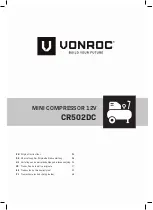
123 of 132
M-SV-001-EN Rev.E
Table 26 - Acronyms/Terms
(Continued)
Acronym / Term
Definition
Permanent Magnet
Motor
Type of motor that uses permanent magnets to produce torque.
Portable Document Format. A format created by
Adobe Systems, Inc
. that uses
Adobe Acrobat
software to create documents that
can be shared for reading and printing without needing the source document’s creation tool. The documents can be read using
the free
Adobe Reader
, available at
PDF has become the de facto standard for sharing documents.
Power Cycle
A reset of the compressor electronics caused by turning off the main power supply, allowing the capacitor bank to discharge until
the power to the Backplane is lost, followed by reapplying main power.
Pressure Ratio
The absolute discharge pressure divided by the absolute suction pressure.
Proximity Sensor
Sensors that are able to detect the presence of nearby objects without any physical contact. A proximity sensor often emits an
electromagnetic or electrostatic field, or a beam of electromagnetic radiation (infrared, for instance), and looks for changes in the
field or return signal.
PWM
Pulse Width Modulation. A method of switching voltage on and off at fixed but variable frequencies.
RAM
Random Access Memory, when powering off a device with RAM, all that memory is lost.
REFPROP
Reference Fluid Thermodynamic and Transport Properties, see NIST.
Reset of fault
To reset a non critical compressor fault, the interlock circuit must be closed and the reason for fault activation corrected. set
demand to 0 (zero) by either writing 0 if control mode is modbus or reducing demand voltage to 0 if control mode is analog input.
Close the interlock, then set demand greater than 0% and fault will reset allowing compressor to restart. (Note IGV may need to
reset before compressor will restart).
Resistor
A resistor is an electrical component that limits or regulates the flow of electrical current in an electronic circuit.
RFT
Range Fault Triggering; see Section 4.2.1 (Compressor Fault Troubleshooting)
RMS
Root Mean Square.
SCR
Silicon Controlled Rectifier. The SCR is a semi-controlled, solid-state device that controls current and converts AC to DC.
Serial Driver
A PCB plug-in responsible for the operation of the IGV stepper motor and optional expansion valves. It contains four relays for the
solenoid valves, compressor status and Compressor run status.
SH
Superheat: The sensible heat added to a refrigerant thus increasing its temperature following evaporation of all liquid present.
Shrouded Impeller
An impeller with boxed in, or “shrouded,” impeller blades, as opposed to an open impeller.
SI
System International, the International System of Units,
Single-Stage
Centrifugal
Compressor
Type of centrifugal compressor having one impeller.
Slip Compensation
Though the compressor utilizes a permanent magnet motor where slip is normally not an issue, the compressor does compensate
for the motor slip by giving the frequency a supplement that follows the measured motor load according to the implemented
motor control algorithms.
SMT
Service Monitor Tools, a PC program provided by DTC. A user friendly way of displaying compressor data to the user and offer
adjustment of predetermined parameters. The user interface adjusts itself according to the active access level at the compressor.
Snubbers
Capacitors responsible for eliminating electrical noise/harmonics from the DC Bus before it reaches the Inverter.
Soft-Start Board
The Soft Start Board limits in-rush current when power is applied to the compressor by progressively increasing the conduction
angle of the voltage through the SCRs to charge the DC capacitors.
Thrust Bearing
A bearing that absorbs the axial forces produced in a centrifugal Compressor by the refrigerant pressure differential across the
impeller.
Touchdown
Bearings
Carbon races or ball bearing for the purpose of preventing mechanical interference between the shaft and the magnetic bearings.
Two-Stage
Centrifugal
Compressor
Type of centrifugal compressor having two impellers. The first-stage impeller raises the pressure of the refrigerant vapor
approximately halfway from the cooler pressure to the condenser pressure, and the second-stage impeller raises the pressure the
rest of the way. With a two-stage compressor, an interstage economizer may be used to improve the refrigeration cycle efficiency.
TXV
Thermal Expansion Valve. A pressure-dependent refrigerant metering device that operates independently and is controlled by
temperature.
Vaned Diffuser
An assembly of plates with curved vanes that serve to slow, compress, and reduce refrigerant rotation as it enters the second-
stage impeller.
Appendix A Acronyms/Terms
Summary of Contents for Turbocor TT-300
Page 2: ...THIS PAGE INTENTIONALLY LEFT BLANK...
Page 4: ...4 of 132 M SV 001 EN Rev E THIS PAGE INTENTIONALLY LEFT BLANK...
Page 12: ...12 of 132 M SV 001 EN Rev E THIS PAGE INTENTIONALLY LEFT BLANK...
Page 61: ...61 of 132 M SV 001 EN Rev E Compressor Components Figure 56 Stator Thermistor R T Curve 1...
Page 120: ...120 of 132 M SV 001 EN Rev E THIS PAGE INTENTIONALLY LEFT BLANK...
Page 130: ...130 of 132 M SV 001 EN Rev E Notes...










































